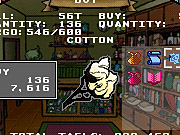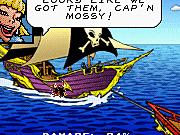Never in a million years would you expect to see a game like Sea Trader: Rise of Taipan on the Game Boy Advance. It's a shipping simulation set in the days of yore, when pirates and sea serpents roamed the oceans. Your sole purpose is to purchase goods from one seaport and transport them safely to another, where you'll sell them at a profit. In between, you'll end up fighting pirates, bribing customs agents, and trading with other sailors on the high seas. If you're the sort of person who tends to dive right into economy-based sims, there's a good deal to like about Jaleco's Sea Trader.

The concept feels totally ridiculous at first, especially since the majority of the action is expressed through cutscenes that are drawn in a campy style reminiscent of comic books from the 1960s. Once you delve into the mechanics of the game, however, it's difficult to stop playing. Some of this is due to its open-ended nature. You can travel to any city you like, upgrade your ship, take out bank loans, hire new first officers, and seek out gossip at the local tavern. When you're at sea, you'll encounter a variety of pirate ships, trading vessels, and military ships, but it's up to you to decide whether you'll attack the pirates or opt to prey on the other merchants instead. If you like, you can choose to hail passing ships in order to trade with or rob them. The only limits placed on your freedom are the amount of money you have at any given time and the number of days remaining until the game ends, which you specify from the beginning.
The artificial economy in the game is well organized and full of variety. Commodities are separated into the categories of finished goods, materials, groceries, and illegal contraband. Merchants in each city sell a handful of items from each category. For example, a shop in the United Kingdom will have paper and oil, which are materials; tea, which is a grocery item; and books, which are finished goods. Your goal is to buy items at a low price from one merchant and sell them to a merchant in another city for a profit. Prices fluctuate constantly and certain goods are unique to specific regions. At the same time, you also have to cope with a full range of idiosyncratic happenings that befall traders on the high seas. Surpluses and famine can affect the prices of goods, there are storms and shallow reefs that can damage your boat, and run-ins with pirates are commonplace. The taverns, banks, shipyards, warehouses, and customs offices located in each city sell information and services that can help you predict and weather these events, but here too there are underlying factors to consider. Each warehouse may have its own unique flaw, like rats or thieves, and you can't even get into a customs office without first building up your reputation and bribing the local official.
Repetition is a necessary evil when it comes to simulation games, and while Sea Trader offers a fair amount of motivation to continue playing despite the constant negotiation of deals and frequent sea battles, it doesn't quite go far enough in some respects. You can purchase 25 different ship upgrades and buy maps that will allow you to access more than 40 cities spread throughout six different regions of the world. At the same time, you'll be rewarded as you achieve a variety of shipping goals and milestones. Still, the overall gameplay doesn't evolve along with your empire. It's possible to max out your ship, maintain a perfect reputation, and earn every award long before your time limit expires, and there isn't much to do after that except stockpile greater amounts of money. In this regard, the lack of a prevailing CPU opponent or an optional mission-based structure is unfortunate, as is the absence of multiplayer link features.

Nor will the game appeal to anyone who is a stickler for graphics and audio. The navigational maps and cutscenes are beautifully drawn, but there is little in the way of animation. You can watch your ship sail across the ocean and cannonballs plow into its bow, but that's about it. As for the soundtrack, you won't hear much more than a few soft melodies interspersed with tones that sound whenever you float into port or acquire some previously unseen item. Regardless, the austere presentation doesn't interfere too terribly with the game itself, since neither the visuals nor the audio play much of a role in your ability to fend off pirates or negotiate a sale.
Fans of PC-based economic simulation games are used to games like Sea Trader, and they're generally much more complex on that platform, but this kind of game is relatively unique on a handheld system such as the Game Boy Advance. For those of you who just want to enjoy a pure simulation on the go, Sea Trader: Rise of Taipan is a welcome change.